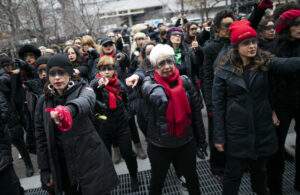Press Gags: Why They Help The Prosecution And Never The Defense
If the family of victims and sundry prosecution witnesses and hangers-on are allowed to disseminate their views to the media, defense counsel should have equal access.

(Photo by Kena Betancur/Getty Images)
When P. T. Barnum said “there’s no such thing as bad publicity,” he wasn’t thinking of a defense attorney’s job in high-profile cases where everything said about her client is damning.
Every high-profile case, whether it involves Bill Cosby, Harvey Weinstein, or a gruesome murder, draws extensive media attention, most of which has the defendant convicted before setting foot in a courtroom.

The Business Case For AI At Your Law Firm

Dealing with the media is tricky at best but even more so when a judge issues gag orders instructing both sides, prosecution and defense, not to speak to the media.
While the judge thinks he may be evening the playing field, he’s actually only handicapping the defense. That’s because a gag order doesn’t prevent prosecution witnesses or their families from speaking to the media, posting online, appearing on television shows, or writing books. Because their points of view mirror the prosecution’s, only the defense is hamstrung.
The defendant, generally in jail on violent cases, doesn’t have the same access to the media as prosecution witnesses. Even if he did, no defense lawyer worth his salt would advise his client to be interviewed by a reporter prior to the trial. There’s just no telling what question might be asked and how any answer, no matter how seemingly innocuous, could be used against him.
I recently tried a high-publicity murder case involving the killing of a 15-year-old outside a bodega in the Bronx. News of the killing went viral when a video of it was released either by police who’d seized it or the victim’s parents. Within days it had over 2 million views.
Sponsored

Navigating Financial Success by Avoiding Common Pitfalls and Maximizing Firm Performance

The Business Case For AI At Your Law Firm


Early Adopters Of Legal AI Gaining Competitive Edge In Marketplace

Navigating Financial Success by Avoiding Common Pitfalls and Maximizing Firm Performance
Because of the tsunami of prejudicial pretrial coverage, the judge imposed a gag order prohibiting lawyers from both sides from speaking to the media. We had a defense, but there no way to present it to the public. By the time trial came, the family had appeared on news and entertainment shows, started their own twitter feeds on “Justice for Junior” (the victim in the case), and was interviewed on a daily basis during the trial by media waiting in the hallway, hungry for leads.
Prosecutors had a de facto way to present their case. We were silenced. When I asked the judge to impose an order prohibiting the family from speaking to the media, he responded he had no power to do that.
All five defendants were convicted.
I see the same thing happening in the Weinstein case. Detailed reports are released daily of what the prosecution witnesses say, but the defense side can only be presented by pool reporters who pick up clues from cross-examination. There’s nothing direct, concrete, or quotable.
Witnesses and nonwitnesses alike, represented by people like Gloria Allred, appear on television shows to further promote the prosecution’s narrative.
Sponsored

Is The Future Of Law Distributed? Lessons From The Tech Adoption Curve

Legal AI: 3 Steps Law Firms Should Take Now
Meanwhile, defense attorney Donna Rotunno was chided in court Friday for speaking to the New York Times although the interview, released just recently, actually occurred before the gag order was imposed.
Prosecutors downplay the inequity, saying jurors are instructed to ignore the media. But let’s face it, anyone in the last month opening a browser to look at his email has been confronted with news about the Weinstein case.
If the family of victims and sundry prosecution witnesses and hangers-on are allowed to disseminate their views to the media, defense counsel should have equal access.
For lawyers facing this issue, I have a suggestion. First, argue against a gag order as it only prevents the defense message from being heard. These cases are fought in part in the court of public opinion, not just the courtroom.
Next, if it looks likely a judge will shut down media communication, get out in front of it by offering your defense early and often.
Easier said than done because defense attorneys often don’t know exactly what their defense will be until seeing what evidence is presented. But if positive media statements are phrased generally enough and suggest a plausible defense, the gamble’s worth it to get more than just the prosecutor’s version to the public.
Remember, it’s from those very people that an impartial jury is supposed to be chosen.
Toni Messina has tried over 100 cases and has been practicing criminal law and immigration since 1990. You can follow her on Twitter: @tonitamess.







